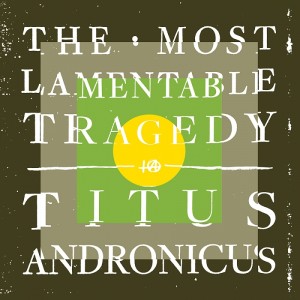Comparing the new Titus Andronicus(hereafter +@) album, The Most Lamentable Tragedy(hereafter TMLT), to another album in existence is an exercise in futility. A fairer work of art to compare it to would be James Joyce’s Ulysses in terms of sheer verbal density, wealth of motifs, and commitment required by the consumer. Stated bluntly, TMLT is a rock opera masterpiece that because +@ are committed to taking the listener on a very specific journey oftentimes at the expense of modern pop conventions.
To review such an expansive album do you first tackle the words or the music? The lyrics tell the story but the music gives those words breath, so let’s start there. +@ is a band operating at its peak. The music is muscular and brainy, quirky and calculated, dark and light. The sonic dichotomies present on the album exist not for the sake of variety but to highlight the differences between the highs and lows of life and, ultimately, how wonderful they can be when taken together as pieces of the whole.
While the casual listener may be drawn to the fully fleshed out songs, it is the off-kilter songs, the “interludes,” that make the album stand out amongst its similarly lofty-minded peers. These songs, while sometimes brief, exist to do more than simply bridge chord progressions; they play a pivotal role in progressing the story while simultaneously existing as stand alone works. For all of the praise that Tommy and Quadrophenia have had bestowed upon them over the years, Pete Townshend never successfully melded his musical themes with his story’s themes; the ideas always stood looking each other in the eyes, separate. Rather than reinforcing an idea with a defined recurring melodic motif throughout the album, +@ defines the ides through the feel of sound. As the main character’s psyche ebbs and flows, so too does the music, and even if the words are sometimes undecipherable, there is no question exactly where we are on this mental journey.
In terms of musical DNA, TMLT doesn’t so much wear their influences on its sleeve as it does reflect those who have mattered most to the album’s protagonist. Without trying very hard, you can immediately hear Born To Run in the layered strings and glockenspiel; you can hear Jailbreak in the harmonized guitar leads; you can hear Bat Out Of Hell in the opening chords of (S)he Said/(S)he Said; you can hear the most Weezer-esque guitar solo this side of The Blue Album on Fatal Flaw. There are songs that almost remind you of David Bowie, Fu Manchu, The Clash, Foreigner, The Guess Who, even old-time gospel music, but at no time does it feel like someone trying to mimic a sound they’ve heard, it simply shows traces of the music that has shaped the author.
The wordplay on TMLT is quite simply dazzling. It swings from unrestrained verbosity to repetition of simple phrases. It spews forth demands and calls to action that sound like universal punk anthems but are in reality internal motivations. TMLT is poetry – thick, confusing, rewarding poetry. In an effort to ensure that the message of this album is lost in reviews talking about the length of the album or other trivial nonsense *see above paragraphs*, singer Patrick Stickles was kind enough to annotate the entire album on Genius.com which, if you have an hour or two, is absolutely worth the time to read through.
There is no way to concisely review this record because it is a true work of art that will take years to fully appreciate all the pieces. You could write an entire essay about each individual song and a thesis statement on interconnectivity of them all. The bottom line is, this album is a tremendous achievement for Titus Andronicus. It is not often a group creates something as great as the albums that inspired them but with The Most Lamentable Tragedy, Titus Andronicus takes its rightful place, shoulder-to-shoulder with some of the greatest musical works of all time.
peace,
daniel
